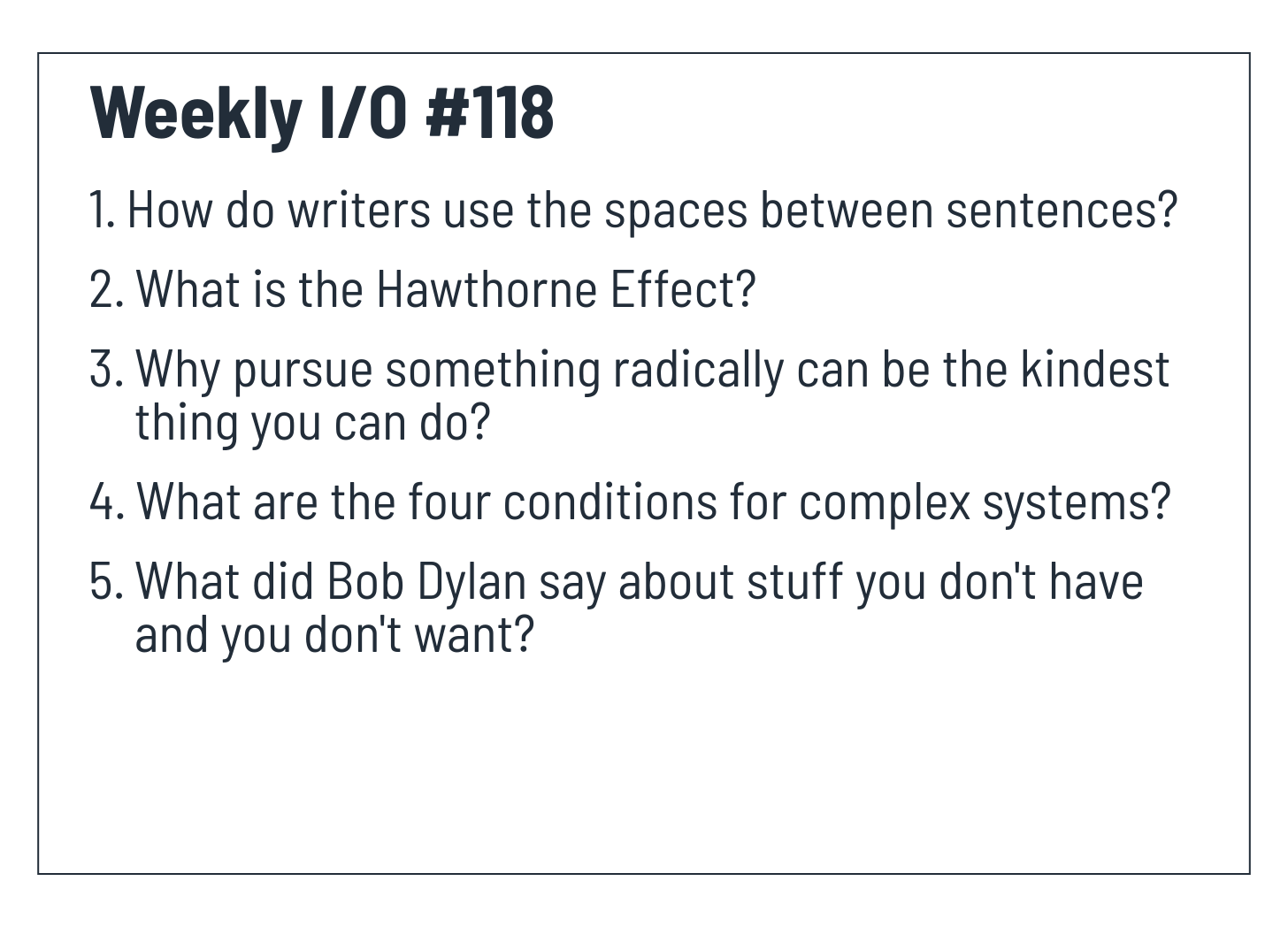Spaces between sentences, Being watched changes behavior, The kindest thing
Weekly I/O #118: Spaces Between Sentences, Hawthorne Effect, The Kindest Thing, Four Conditions for Complex Systems, Grateful for Not Wanting
Hey friends,
Here’s your weekly dose of inputs and outputs. Happy learning!
Help you absorb better with Forward Testing Effects
Input
Here’s a list of what I learned this week.
1. The spaces between sentences are where meaning grows. Writers use these gaps intentionally to invite readers to fill in what’s missing, creating surprise, tension, or emotional depth through what remains unsaid.
Podcast: 083. Edward Yang: Yi Yi
Why does some writing make us pause between sentences when reading?
This is the “spaces between sentences”, gaps in thought when one sentence ends and another begins. Sometimes the connection is clear. Other times, the reader must pause and imagine what connects them.
In writing, those “spaces” invite the reader to do part of the work. Instead of being told everything, the reader senses what’s missing and fills in the gaps. The meaning or emotion often grows in that moment of quiet thinking.
For example:
“It started raining. We ran inside.” Clear cause and effect.
“It started raining. She smiled.” Why? You fill in the reason.
“He set the photograph on the table. The room felt colder.” You feel the grief without being told.
“Everyone clapped. She was already gone.” You imagine what happened between.
“He closed the door. Ten years later, she knocked.” That one space holds a decade.
Writers use this intentionally. Spaces between sentences are not empty. They’re where the reader’s imagination steps in. The space holds what’s not said.
2. The Hawthorne Effect: People change their behavior simply because they know they’re being observed. Attention itself influences performance.
Article: Joanne Yatvin: Let More Teachers Re-Invent the Wheel, Or Why We Don’t Need Standardization
Why do we suddenly become more productive when someone is watching?
The Hawthorne Effect was discovered in the 1920s factory studies, where Researchers found that the workers’ productivity improved simply because they knew they were being studied. The effect suggests that people tend to change their behavior due to awareness of being watched.
We are social creatures, and being watched oftentimes matters more than we think.
And in educator Joanne Yatvin‘s words:
“When people believe they are important in a project, anything works, and, conversely, when they don’t believe they are important, nothing works.”
Hawthorne Effect can be found almost everywhere. Supervisors improve performance by showing interest. Teachers see temporary gains when students know evaluation is coming.
In more modern settings, people also apply this effect to productivity monitoring software to increase performance. It also explains why some people perform better in public commitments or accountability groups. The act of being seen changes how we act.
However, there’s a catch. The effect is often temporary. Once the novelty of observation wears off, behavior tends to return to baseline. Unfortunately, sustainable improvement requires more than just attention.
This also reminds me of the Elevator Mirrors Psychology.
3. The kindest thing any of us can do is to pursue something radically that serves others in some way, because you never know how it might change the course of human life.
Podcast: Find Your X, Nurture Your N
I love this response from Rick Buhrman when he was asked, “What is the kindest thing that anyone’s ever done for you?”:
Our oldest son, Theo, who just turned 7, spent the first 6 months of his life in several NICUs. He was eventually helicoptered to Indianapolis at Riley Children Hospital. And while we were living in that NICU for almost half a year, we saw a lot of kids who passed away. Most of those kids were not as sick as Theo was.
I don’t know exactly why Theo survived, but I know that a major part of how he survived was because for several decades leading up to that moment, numerous nurses, nurse practitioners, respiratory therapists, doctors, surgeons have committed themselves wholeheartedly to mastering their craft. I could give you tons and tons of examples of these people.
And I know that in the moment, it wasn’t necessarily viewed as kindness, but maybe in some sense, the kind of thing that all of us can do is to pursue something radically that in some ways in service to others because you just don’t know how it’s going to change the trajectory of human life. And so for all of those medical practitioners, none of whom I’m sure are listening to this, I owe everything to you because they gave me the gift of being
This reminds me of Steve Jobs’ building wonderful products as a deep appreciation for the rest of our human species.
4. Complex systems emerge when four conditions are met: sufficient interacting parts, local autonomy, negative feedback loops, and limited randomness. These universal rules explain how order arises from disorder across all scales, from atoms to societies.
Book: Notes on Complexity




